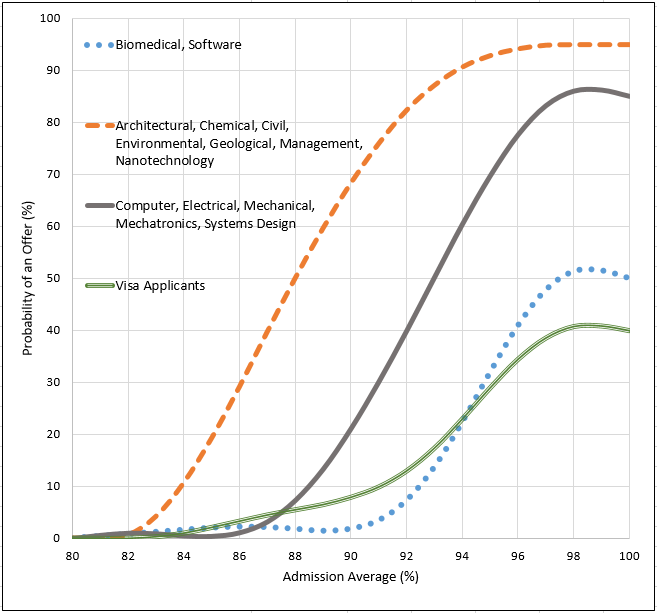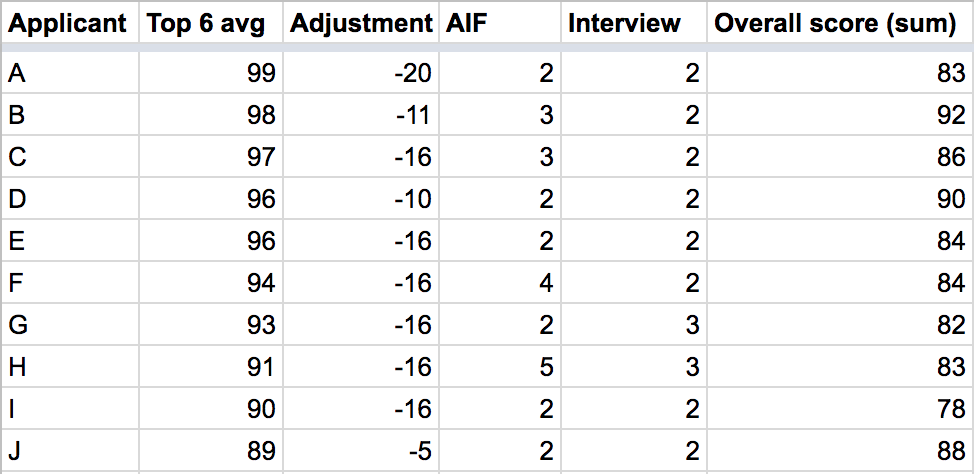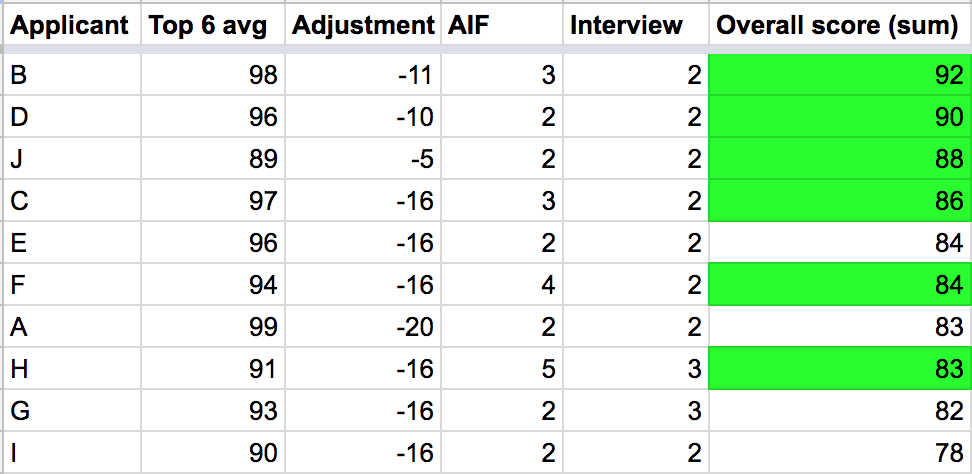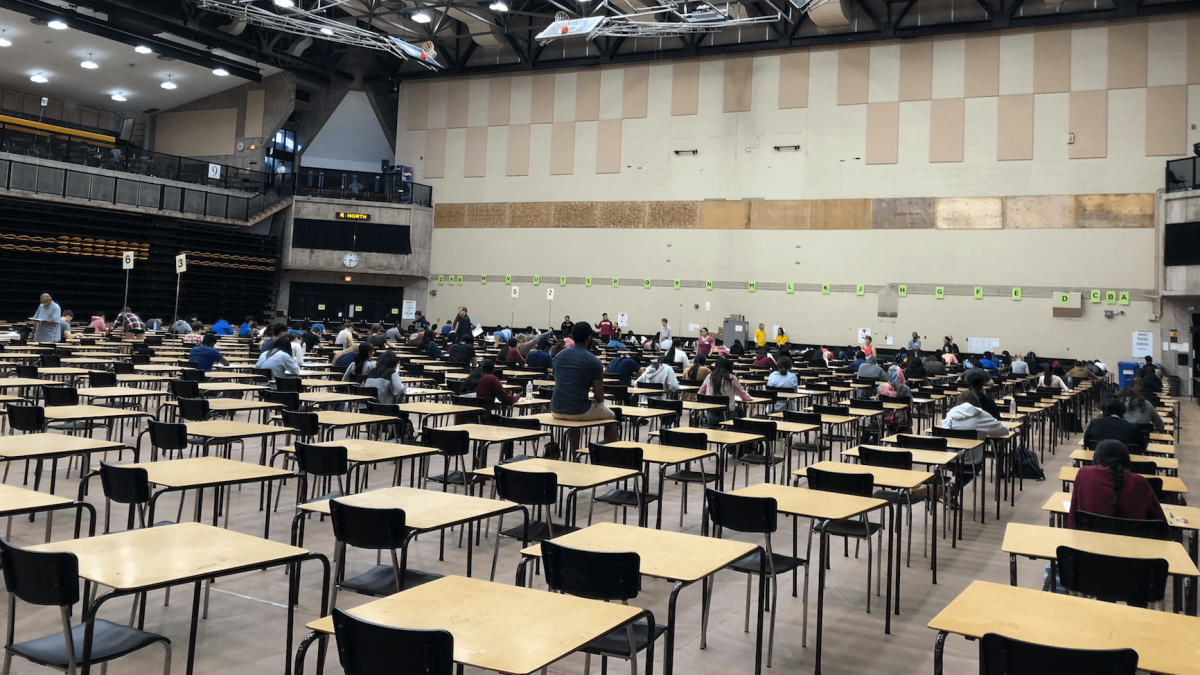In this post, I write about tips for getting into University of Waterloo’s Engineering programs. It also features insights from the Director of Waterloo Engineering Admissions and recently admitted students.
February 19, 2014. I vividly remember the day I was admitted into University of Waterloo’s Software Engineering program. I screamed in excitement, spun in my chair, and repeatedly jumped up and down. I told my parents and they were obviously ecstatic to hear the news. It was a moment that I won’t ever forget.
Four years ago, I wrote a post on how to write a great AIF. Since then, hundreds of students have thanked me for writing the post, whether in person or online. Now that I’ve graduated, I wanted to give back to the community one last time. I want to help other people experience that memorable moment I experienced four years ago.
This post would not be possible without Professor Bill Anderson, the Director of Waterloo Engineering Admissions. Please note that the contents of this post is referring to Waterloo Engineering admissions, and may not be applicable to other faculties.
Admissions Criteria
Each applicant will have an admission score. This is the sum of the admission average + AIF score + adjustment factor + video interview.
1. Admission average
The admission average is your top 6 courses, which include English, Advanced Functions, Calculus, Chemistry, Physics, and one other course.
This is the most important factor, as you can objectively control this score. However, for the most competitive programs, a 96% average yields about a 40% chance of getting in. Please note that probability for the 98% to 100% range was a result of the mathematical model to fit the curve, so it doesn’t represent a real reduction in probability of admission.

2. AIF score
The admission information form (AIF) is worth up to 5 points. You’ll have the opportunity to brag about all your accomplishments and future aspirations here.
Most students overestimate their AIF score. According to Professor Anderson, the majority of applicants score in the 1-2 range. Scores of 4 and 5 are reserved for applicants with highly distinguished accomplishments in the national and international ranks. They make up less than 10-15% of all applicants.
3. Adjustment factor
The adjustment factor is the difference between the first year engineering average and the admission average, grouped by school or region. The adjustment factor is only used when there is a sufficient amount of data points from the specific school or region for the past 6 years.
A recent Global News article featured Waterloo Engineering’s adjustment factor tool used for admissions. The full spreadsheet can be found here: Waterloo Engineering adjustment factor. Full credit to Patrick Cain from Global News.
The average adjustment factor is 16%. We observe that there are schools in the range of 10% to 13%, which represent a pretty significant advantage. There are also a few schools with adjustment factors above 20%, which negatively impact those students’ chances. This concept is also applied to provinces and international applicants. New Brunswick students had adjustment factors of 26% versus Quebec CEGEP grads who had adjustment factors of 5%. If an Ontario school isn’t on the list, it means there isn’t sufficient data points and that the adjustment factor is 16%.
This concept may be considered controversial because it’s heavily weighted and it’s not a factor that students can control. This means that not all schools are considered equal. According to Waterloo Engineering, over 90% of high schools are not adjusted, i.e. the adjustment factor is 16%. However, for schools on either end of the spectrum, there exists a significant gap. To put it into perspective, I will use the North York region as an example.

I attended Northview Heights SS which has an adjustment factor of 10.1%. This represents a 5.9% advantage over the average adjustment factor of 16%. If I had a 91% average at Northview, then I might be considered a stronger applicant than someone with a 95% average at a school with the average adjustment factor.
Northview applicant’s net score: 91 – 10.1 = 80.9
Other applicant’s net score: 95 – 16 = 79.0
On the other hand, George S Henry Academy has an adjustment factor of 22.4%, which is a 6.4% disadvantage. Similarly, this means a student with a 95% average at George S Henry Academy has worse chances than someone with a 91% average at a school with the average adjustment factor.
GSHA applicant’s net score: 95 – 22.4 = 72.6
Other applicant’s net score: 91 – 16 = 75.0
Professor Anderson also says “We may also make adjustments for unusually high grades in required courses taken outside of a regular day school, such as at summer, night or private school.” Their reasoning can be found here, so I would recommend taking required courses in only your regular day school.
4. Video interview
This is a new, optional component of the admission process for Waterloo Engineering, worth up to 3 additional points. It resembles a future co-op interview, where you try to sell your personal goals and interests to the Waterloo admission team. The average score is 2, and very few people score 3’s. Professor Anderson mentioned that an applicant with a 3 point response can clearly communicate their motivation and future aspirations to the evaluator.
How Admissions Work
This is a high-level description of how admissions work. In reality, there are many more complexities and nuances.
For each program, the admissions team will sort the applicants in descending order of their admission score. The applicants who have amongst the highest scores will probably receive an offer. After the majority of offers are allocated, there will eventually be a point where applicants are only separated by a small margin, i.e., 1%. At this point, the admissions team might handpick the applicants, since their scores are so close to each other. The AIF will become a strong deciding factor in this situation.
I’ve constructed a hypothetical case to help readers visualize the admission process. Let’s assume there are ten applicants for the Software Engineering (SE) program and only four allocated spots in the program. The admissions team will send out more offers than targeted spots, as not every student will accept their offer. The SE program usually sends out 1.5x more offers than allocated spots. To fill four spots, the admissions team would likely send out six offers, which represents a targeted acceptance rate of 66.7%.
In Figure 1, there are 10 made up applicants listed with their admission average, AIF score, adjustment factor, and video interview score. The overall admission score is the sum of these four factors. Note that the applicants are ordered by descending admission averages.

In Figure 2, the applicants are sorted in descending order of their overall admission score. Applicants B, C, and D all had amongst the strongest overall scores, so they will each receive an offer. Although Applicant J only had an 89% admission average, they benefited greatly from the adjustment factor of 5% (CEGEP grad from Quebec).

Now, we have two more offers to send out, and there are four applicants with an 83 or 84 overall score. For the final spots, the admission team will likely handpick the applicants, since the margin is so small. Applicant A has an amazing 99% admission average, but is weighed down by their school’s poor adjustment factor. Applicant E has a pretty strong case as well. Applicant F has a solid average, and a great AIF. Applicant H has a lower average, but received perfect scores in the AIF and video interview, which is quite rare. In this scenario, all four of these applicants are suitable picks. The admissions team might end up giving offers to Applicant F and H due to their strong AIF scores.
The goal of the admissions team is to attract top talent to Waterloo and hopefully watch them graduate. In an ideal world, 100% of first year engineering students will graduate from the University of Waterloo in their admitted program and on time. However, this is far from reality. University is arguably more difficult than high school, so some students will fail in academics. Students may also discover that the program they chose was not the right fit for them, and end up pivoting to something else. The admissions team seek these two factors from applicants: a high likelihood to succeed academically and a genuine interest in the program.
For the first factor, high grades in AP or IB courses or at “good” schools are convincing reasons to demonstrate potential success in university academics. For the second factor, the admissions team want applicants who can clearly articulate their passions for their specific engineering program. The admissions team wouldn’t want to admit someone who fails to demonstrate interest in their program.
Timeline
The application process isn’t just a 6 month process, but rather a multi-year process.
Pre High School
The process begins with parents choosing the right high school for their child. As mentioned earlier, there is an adjustment factor that rewards students from “good” high schools and penalizes students from “less good” high schools. Although this can definitely make a difference in admission decisions, the more important factor is nurturing the child in an environment where they can be happy and succeed.
Grade 9 & 10
Grade 9 and 10 marks don’t affect your chances for admission. Your goal should be to get decent marks, build up a strong academic base, and then rev up the engine for your grade 11 and 12 marks. You should get involved with a few extracurriculars and then eventually narrow
down to one or two that you’re super passionate about. For extracurriculars, depth (quality) is better than breadth (quantity).
Grade 11
Ideally, by grade 11, you should have a better sense of what you want to do in the future. If you don’t know, that’s totally fine. Personally, I think it’s a bit ridiculous that society expects us to know what we want at age 16!
It may be wise to take some grade 12 courses while you’re in grade 11. I personally took advanced functions (MHF4U) and CS (ICS4U) in my 2nd semester of grade 11. It was a great decision because I could focus my time on those two courses in an easier grade 11 workload.
For extracurriculars, you should be heavily involved in one or two things. Hopefully, your involvement can yield recognizable accomplishments. Getting some work or volunteer experience in your desired field would also look fantastic on your AIF.
Grade 12
In grade 12, your top priority should be to get high grades in your required courses. Your second priority is crafting a great AIF with all of the experiences you’ve gathered in previous years. If you don’t have many experiences, that’s fine as well—-focus on selling your potential, i.e., your passions and aspirations.
September-November
University fairs and campus tours usually take place in September to November. During this time period, you should expect to receive instructions on how to apply to post-secondary schools.
December-January
You should be working on your AIF and perfecting it. Submitting it before February is highly recommended.
February-March
In late-February, Waterloo Engineering has an early round of admissions, where they give offers to fill up about 25% of available space. Students who receive early offers must have at least three grade 12 required courses completed, and typically have consistently high grade 11 and 12 marks. Professor Anderson says that “it takes us until mid-April to complete all the AIF and interview scoring, so at this stage it’s somewhat random whether those play a significant role or not for any one individual.”
As mentioned above, grade 11 marks do play a role in early admission. However, not getting an early offer isn’t the end of the world, as the majority of offers are handed out in May. I believe the purpose of early offers is to attract top-performing students to the in-person
March Break open house.
Early offers for applicants outside of Ontario high schools are on a rolling basis, rather than all coming out at once.
April
Midterm marks in the 2nd semester are considered for the May round of admission offers, so applicants have one last opportunity to improve their chances.
May
The final decision is given in May: offer, alternate offer, or no offer. Scholarship decisions are also made during this time based on your overall admission score and AIF. Some entrance scholarships can be found here.
June
Make sure to accept your offer before the deadline, which is typically in June. Don’t slack off too much, as there are minimum grades you need to achieve to keep your offer and scholarships from being rescinded. If you didn’t get an offer to your desired program, you can email admissions to be considered for the waitlist; however, there are no guarantees.
Advice from Recent Applicants
I interviewed several students who were recently admitted into Waterloo Engineering programs. My friend, Gary Zheng, wrote this entire section in the blog post. Big thank you to Gary for his efforts, and shoutouts to Agosh, Tanya, Paul, Mufeez, Kouthar, and Dymtro for sharing their insights.
1. Keep your AIF personal.
This is probably the most important piece of advice offered, iterated on by each student I’ve spoken to.
Do show that you have a vision—a dream—and how Waterloo can help you achieve it. Show your passion and commitment to this dream, and why you want it.
- Do describe how your current skills and experiences apply to your program of choice.
- Don’t just praise Waterloo: talk about yourself. The AIF is a place for you to explain why you are a good fit for Waterloo, and why Waterloo is the university for you.
- Don’t follow sample AIFs as it can lead to less authentic responses.
- Don’t write in essay structure (3-paragraph-hamburger).
- Don’t try to “fluff” your sentences with fancy words—write simple sentences from an interesting perspective. There is a character limit!
2. Start your application early.
Don’t procrastinate! You probably have lots of other stuff to deal with: extracurriculars, homework, other university applications, or maybe even a job. But don’t leave your Waterloo application for the last moment!
Starting early gives you time to revise your AIF. No admissions officer wants to see a sloppy AIF. In terms of revision, it may help to read over your responses from the perspective of an admissions officer to guide your content.
Moreover, submitting your AIF and video response early (before February) qualifies you for early admission. This can be very helpful as you essentially get considered twice, and your grade 11 marks may be better than your grade 12 marks.
3. Extracurriculars!
Extracurriculars will be vital to your application, but don’t panic if you lack extraordinary things to write about. Plenty of students are admitted yearly without having listed many extracurriculars.
Show you’re a well-rounded applicant by having extracurriculars unrelated to the program you applied to (in addition to related ones). But be wary if you do things just for the sake of the AIF, it might be hard for you to write passionately about it.
As for younger students reading this post: start now. Contests are a great way to “pad” your application. Waterloo hosts a bunch of highschool-level contests yearly, for each grade (starting in grade 7). Performing poorly won’t hurt you, but doing well is a plus to your application, and you might even win a scholarship.
4. Make use of resources available to you.
Don’t be afraid to seek help when you have questions, or need help editing your AIF responses. There are numerous resources available to you:
- School counselors (underrated, yet very helpful)
- Professor Anderson’s blog
- William Bishop’s blog
- Current Waterloo students and other applicants
Additionally, research the programs you are applying to. This can help with your AIF content. For example, you could talk about Waterloo engineering’s cohort system, or the senior capstone project.
5. Use numbers.
It would be beneficial to support your achievements with numbers, and provide sufficient context so the evaluator can understand the significance. For example, rather than saying “I created the X application,” you could say, “I created the X application, which has over 5000 weekly active users.” Or, instead of “I scored well on the 2018 Y competition,” say “I scored 98/100 on the 2018 Y competition, ranking top 25 in Ontario.” Use the “Extra Info” section on the AIF to brag about your achievements, no need to be humble.
Very importantly, do not lie. There are horror stories of students having their offers rescinded, or being kicked out later, due to having been caught lying on their AIF.
6. Try to relax during the video interview.
I know it’s easy to say “just relax,” but this is really important. Avoid re-stating the same thing over and over.
One suggestion was to practice with friend and peers. You can also have a friend sit across from you when you are recording, so it feels like you’re talking to them rather than the camera.
7. Stop worrying about other applicants.
Don’t worry about what marks or extracurriculars other applicants have—it doesn’t impact your application. Focus all of your energy on being the best person that you can be.


Hey!,
Do you know the likely admission average for Mechatronics Engineering for 2019 fall?
I currently have a 95.5% but I am sure I can push it up to a 96. However, I head this year, the average will likely be a high 96. Is this true?
Thanks!
I can’t say for sure if that is true or not. The best way to find out would be to ask Waterloo Admissions directly. Here is the link to their site: https://uwaterloo.ca/future-students/contact-us